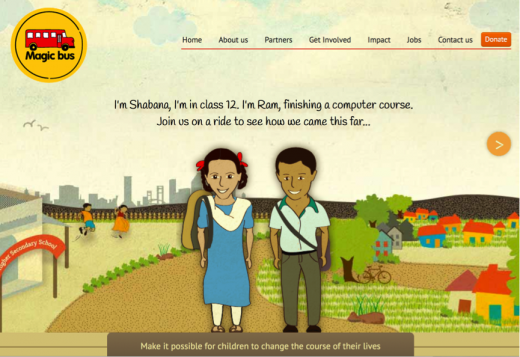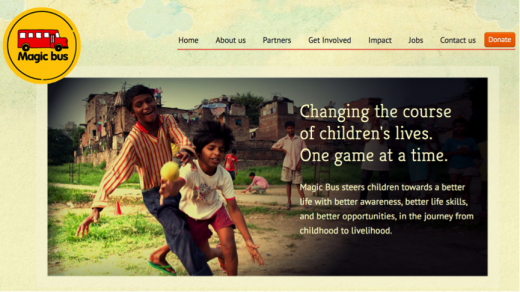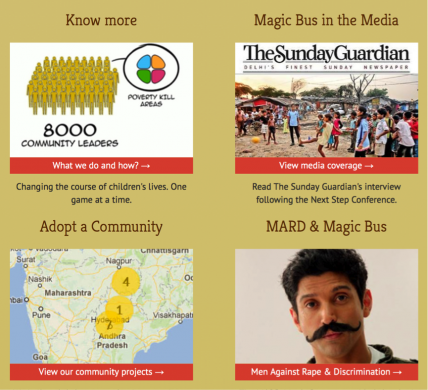Magic Bus helps young people enjoy their childhood and also learn skills to develop a livelihood. It reaches more than 250,000 children in India, for example, by educating over 8,000 leaders who can help young people to develop.
Magic Bus also works in the United States, United Kingdom and Germany. Below are excerpts from its various websites. You can discover more via the following links.
http://www.magicbusgermany.org/
http://www.magicbuscentre.org/

Magic Bus Vision
Magic Bus will give millions of children living in poverty the opportunity to control the way they view the world, the freedom to choose the role they will play in it, and the power to define their own destiny.
Magic Bus Mission
Magic Bus is committed to developing local community mentors who take children living in poverty on the journey from childhood to livelihood.
Over a ten-year period, our mentors work with children and parents through a weekly curriculum of sporting activities, which are used as metaphors to change behaviour in the areas of education, health, gender and livelihood.
We always access existing community partnerships to ensure that young people move from poverty, and develop into young adults with greater control and choice.
All Magic Bus graduates are offered the opportunity to enrol in livelihood programmes creating, at scale, a movement of competent, confident young people ready to make a significant difference to their lives.
Magic Bus Centre For
Learning & Development
The Magic Bus Centre for Learning & Development is a purpose built, 22 acre residential campus providing one of the best outdoor and adventurous experiential learning spaces in India.
Nestled in the valleys of the Sahyadri Hills in Western India, only a 2 hour drive from the cities of Mumbai and Pune, the Centre offers you an opportunity to discover how the expansive outdoors can help people nurture and develop their personal and interpersonal skills that transfer into all areas of education, business and social situations.
Our own unique approach and techniques help you on a journey of self-exploration of your potential through experiential learning.
Engaging, thought provoking and challenging activities combined with careful and constructive facilitation draw out the amazing capabilities you have within.
Through this journey of inward exploration you will come to explore new possibilities – not just for yourself, but those you meet, work and socialise, on the pathway of life.
Activity Based Curriculum
Our Activity Based Curriculum (ABC) is a unique model that uses games to make change. 40 sessions per year – each with a lesson, teach children about education, gender, health, and key issues affecting them. The games excel in building physical, social, and personal skills.
Mentorship Program
Local youth volunteers are trained to be mentors and role models to other children. They conduct ABC sessions and act as catalysts for community change. The children and youth grow up becoming confident, respected and responsible.
“Connect” – Bridging the Final Mile
Our Connect Program bridges the gap between possibility and opportunity through access to training and courses. Nearly all the youth end up pursuing higher studies and/or enrolling in our employability program.
Magic Bus Impact
Magic Bus impacts the lives of its primary stakeholder, the child, in ways that are both manifest and subtle.
Some of these impacts were captured in studies that engaged with children, their parents as well as other members of the community such as teachers and principals. The information below is collated from the following studies.
Praxis Impact Assessments in 2010 and 2012.
Baseline Study of children between the ages of 12 and 17 in 2012 (funded by Comic Relief).
Study of Peer Leaders in the Magic Bus programme, 2011.
Impact Area: Education
Participation in the Magic Bus program makes a child attend more regularly at school, reducing his/her chances of dropping out and increasing the possibility of the child moving into higher grades.
95.7% of the children in our program have an attendance record of over 80%. (Study 2).
98% of the adolescent girls at Magic Bus are in secondary school. (Study 2).
Impact Area: Gender
By the time a Magic Bus child finishes her or his first year in our programme, she or he is more aware of issues relating to gender-equity and rights, and is therefore better equipped to behave fairly with people of any gender.
42% of the participants in our programme are girls. (National MIS).
82% of children feel that sports are as important for boys as for girls. (Study 2).
82.7% children believe that it is equally important to invest in a girl’s as well as a boy’s future. (Study 2).
Impact Area: Health and Hygiene
By the time a Magic Bus child finishes his or her first year, she or he starts exhibiting a high degree of health-related knowledge, beliefs and practices.
77.52% of children at Magic Bus follow good practices related to personal hygiene including hand washing, brushing, bathing and cutting nails. (Study 1).
A 100% of the sample selected of Magic Bus children who graduate from our programme believe:
That open defecation is a major health hazard. (This is significant especially in light of the fact that 60% of Indians still defecate in the open. (Study 3).
That substance abuse (including smoking cigarettes) is harmful. (Study 3).
That playing sports is crucial to maintaining a healthy mind and body. (Study 3).
Impact Area: Sexual
and Reproductive Health
Young women and girls in Magic Bus report a higher degree of control over their sexual and reproductive health.
82.66% of the girls know about and practice menstrual hygiene – washing their pads and drying them in sunlight, changing their pads regularly and maintaining genital hygiene to prevent yeast infections. (Study 1).
77.78% Magic Bus children are aware about their bodies and can differentiate between good and bad touch. (Study 1).
By the age of 12, 80% of children are aware of the permissible legal age for marriage. Under current Indian laws, the legal age for marriage is 18 for girls and 21 for boys. (Study 1).








An insightful read indeed! Addressing equity and access in Indian education is paramount for a brighter future. It’s encouraging to see discussions around bridging these gaps. Speaking of accessibility, I wonder how initiatives like this could extend to regions like Undri, ensuring reputed secondary schools are within reach for all students. Education shouldn’t be a privilege but a right, regardless of location. Looking forward to more conversations on practical solutions to make quality education truly inclusive.